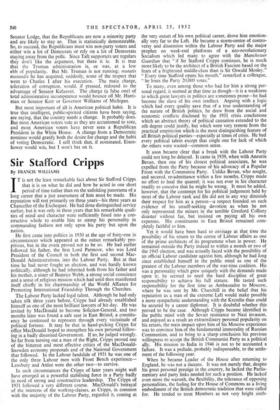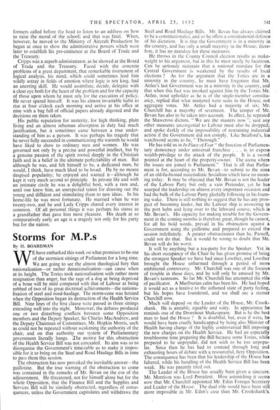Sir Stafford Cripps
By FRANCIS WILLIAMS
IT is not the least remarkable fact about Sir Stafford Cripps that it is on what he did and how he acted in one short period of time rather than on the unfolding panorama of a long career that a just assessment of him must be made. His reputation will rest primarily on three years—his three years as Chancellor of the Exchequer. He had done distinguished service earlier, but it was only in these years that his remarkable quali- ties of mind and character were sufficiently fused into a con- structive whole to enable him to stamp his personality in commanding fashion not only upon his party but upon the nation.
He first came into politics in 1930 at the age of forty-one in circumstances which appeared at the outset remarkably pro- pitious, but in the event proved not to be so. He had earlier followed his father, the first Lord Parmoor, who was Lord President of the Council in both the first and second Mac- Donald Administrations, into the Labour Party. But at that time he had never fought an election, and was hardly known politically, although he had inherited both from his father and his mother, a sister of Beatrice Webb, a strong social conscience and a sense of religious mission which had until then manifested itself chiefly in his chairmanship of the World Affiance for Promoting International Friendship Through the Churches.
The Labour Party lacked legal talent. Although he had only taken silk three years before, Cripps had already established himself as one of the most brilliant lawyers of his day. He was invited by MacDonald to become Solicitor-General, and two months later was found a safe seat in East Bristol, a constitu- ency he continued to represent through every vicissitude of political fortune. It may be that in hand-picking Cripps for office MacDonald hoped to strengthen his own personal follow- ing in a badly disunited Government. If so, he judged wrongly. So far from turning out a man of the Right, Cripps proved one of the bitterest and most effective critics of the MacDonald- Snowden economy proposals and of the National Government that followed. In the Labour landslide of 1931 he was one of the only three Labour men with Front Bench experience- Lansbury and Attlee were the other two—to survive.
In such circumstances the Cripps of=later years might well have emerged as a powerful stabilising force in a Party badly in need of strong and constructive leadership. The Cripps of 1931 followed a very different course. MacDonald's betrayal of the interests of the working-cla-gses, as Cripps, in common with the majority of the Labour Party, regarded it, coming at the very outset of his own political career, drove him emotion- ally very far to the Left. He became a storm-centre of contro- versy and dissension within the Labour Party and the major prophet on week-end platforms of a neo-revolutionary Socialism which led many to agree with the Manchester Guardian that " if Sir Stafford Cripps continues, he is much more likely to be the architect of a British Fascism based on the fears of a frightened middle-class than is Sir Oswald Mosley." " Every time Stafford opens his mouth," remarked a colleague, he loses the Party 20,000 votes."
To many, even among those who had for him a strong per- sonal regard, it seemed at that time as though—it is a weakness to which great lawyers in politics are sometimes prone—he had become the slave of his own intellect. Arguing with a logic which had every quality save that of a true understanding of the nature of British politics, he drew from the social and economic conflicts disclosed by the 1931 crisis conclusions which an abstract theory of political causation extended to the nth degree could justify, but which were very remote from the practical empiricism which is the most distinguishing feature of all British political parties—especially at times of crisis. He had every political talent except that single one for lack of which the others were wasted—common sense.
It soon became clear that a break with the Labour Party could not long be delayed. It came in 1939, when with Aneurin Bevan, then one of his closest political associates, he was expelled from the Party because of his advocacy of a Popular Front with the Communist Party. Unlike Bevan, who sought, and secured, re-admittance within a few months, Cripps made no effort to heal the quarrel; it was not ever in his character readily to conceive that he might be wrong. It must be added, however, that the contempt for his political judgement held by most of the Labour rank and file did not in any way diminish their respect for him as a person—a respect founded on such evidence of his unself-seeking devotion as when he not only represented the miners in the terrible Gresford Colliery disaster without fee, but insisted on paying all his own expenses. His constituents in East Bristol remained com- pletely faithful to him.
Yet it would have been hard to envisage at that time the possibility of his return to the centre of Labour affairs as one of the prime architects of its programme when in power. He remained outside the Party indeed to within a month or two of the.1945 election, and was actually faced with the possibility of An official Labour candidate against him, although he had long since established himself in the public mind as one of the greatest of the Labour members of the war-time coalition. His was a personality which grew uniquely with the demands made upon it; he seemed to need the hard discipline of great responsibility to achieve his full stature. He tasted such responsibility for the first time as Ambassador to Moscow, where he was sent by Mr. Churchill in the belief that his reputation as a man of the extreme Left would make possible a more sympathetic understanding with the Kremlin than could be secured by a career 'diplomat. It is doubtful whether this proved to be the case. Although Cripps became identified in the public mind with the Soviet resistance to Nazi invasion, and enjoyed as a result an extraordinary personal popularity on his return, the main impact upon him of his Moscow experience was to convince him, of the fundamental immorality of Russian Communism, and to bring to a sharp conclusion his previous willingness to accept the British Communist Party as a political ally. His mission to India in 1946 is not to be accounted a failure. It was a prelude, probably indispensable, to the settle- ment of the following year.
When he became Leader of the House after returning to England, he was not a success. It was not merely that, despite his great personal prestige in the country, he lacked the Parlia- mentary and party links needed for such a position. He lacked even more the warmth, the flexibility, the tolerance of opposing personalities, the feeling for the House of Commons as a living embodiment of the British democratic tradition that were called for. He tended to treat Members as not very bright sixth- formers called before the head to listen to an address on how to raise the moral of the school; and that was fatal. When, however, he moved to the Ministry of Aircraft Production he began at once to show the administrative powers which were later to establish his pre-eminence at the Board of Trade and the Treasury.
Cripps was a superb administrator, as he showed at the Board of Trade and the Treasury. Faced with the concrete problems of a great department, that remarkable instrument of logical analysis, his mind, which could sometimes lead him wildly astray in fields of emotion where logic is not king, had an unerring skill. He would assimilate, decide, delegate with a clear eye both for the heart of the problem and for the capacity of those upon whom he must rely for the execution of policy. He never spared himself. It was his almost invariable habit to rise at four o'clock each morning and arrive at his office at nine with a bag full of official papers already digested and the decisions on them taken.
His public reputation for austerity, for high thinking, plain living and an almost inhuman absorption in duty had much justification, but it sometimes came between a true under- standing of him as a person. It was perhaps his tragedy that he never fully succeeded in communicating the warmth he would have liked to show to ordinary men and women. He was governed not only by a precise and powerful intellect, but by a genuine passion of the spirit rooted deeply in the Christian faith and in a belief in the ultimate perfectability of man. But although he was, and felt himself to be, a dedicated man, he would, I think, have much liked to be loved. He by no means despised popularity; he enjoyed and wanted it—although he kept it very much second to principle. In private life and with an intimate circle he was a delightful host, with a rare and, until one knew him, an unexpected talent for drawing out the young and diffident and stimulating them to new ideas. In his home-life he was most fortunate. He married when he was twenty-two, and he and Lady Cripps shared every interest in common. Of all personal things it was perhaps his status as a grandfather that gave him most pleasure. His death at so comparatively early an age is a tragedy not only for his party but for the nation.



































 Previous page
Previous page